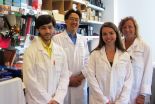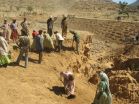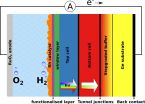Social media data could contribute to conservation science
2015-09-15
(Press-News.org) Planning conservation actions requires up-to-date information on
Biodiversity is diminishing at unprecedented rates, and quick decisions are needed in what and where to protect.
"The decisions should be based on comprehensive information, but scientists do not have enough resources to collect more data and effectively monitor all species and habitats that need protection. As human are the main driving force of global change, conservation also needs information on human presence and behaviour" says Enrico Di Minin, a researcher in conservation science at the Department of Biosciences, University of Helsinki, Finland.
Using the data produced by the nature enthusiasts is considered as one of the ways to effectively collect supportive data when resources are limited. An important limitation, however, is that citizen science requires systematic organization, marketing, commitment, and skills, so it is mostly focused in the developed world.
Researchers from the University of Helsinki argue that mining freely-available data from social media platforms could help address some of these issues. Social media platforms provide a place for sharing biodiversity-related content and posts on nature experiences.
Such posts include a wealth of information about what users find meaningful to post about. They may reveal species people have spotted or tell which landscapes they like. Content of the posts may also reveal why users were visiting specific locations. The profiles and contents of social media users can be used to extract background information about who the users are, including their country of origin, the language spoken, and gender.
Getting to the public content doesn't need special equipment.
"The public content of most social media platforms can be accessed via ready-made application programming interfaces. In addition to the text and images, the posts often have coordinates and a time stamp that can be used in analyses," says Henrikki Tenkanen, a PhD student in geoinformatics at the University of Helsinki.
Social media data may be useful for example for managers in national parks. "It can give additional information on where and when tourists visited national parks, and provide information on their activities and preferences," says Dr. Tuuli Toivonen, a tenure track professor in geoinformatics. "In some cases, it could be used to collect information on the mobile populations of species, at higher accuracy than traditional sources of data. National parks could increasingly encourage their visitors to post about their experiences, with a common hashtag."
The researchers point out that there are challenges that need to be considered when using social media data. Ethical concerns have also to be taken into account.
INFORMATION:
ELSE PRESS RELEASES FROM THIS DATE:
2015-09-15
A new study has found increasing support in the United States and Canada for smokefree laws for outdoor areas, especially in playgrounds and school grounds.
The collaborative study between the University of Otago, New Zealand and University of Alberta, Canada, provides new and some unexpected insights for health promotion in North America. A key finding is that most residents welcome smokefree laws. Support was strongest for smokefree playgrounds and school grounds, but there was also majority support for a range of other smokefree areas.
University of Otago, Wellington ...
2015-09-15
Highly diluted acetic acid, an active ingredient of household vinegar, has been shown to be an effective alternative agent to prevent infection and kill bacteria found in burn wounds.
Researchers from the University of Birmingham and the National Institute for Health Research (NIHR) Surgical Reconstruction and Microbiology Research Centre (SRMRC) investigated the antibacterial activity of acetic acid against key burn wound colonising organisms growing both planktonically and as biofilms.
Burns are a common traumatic injury and prone to becoming infected due to loss ...
2015-09-15
On Sept. 13, 2015, as NASA's Solar Dynamics Observatory, or SDO, kept up its constant watch on the sun, its view was photobombed not once, but twice. Just as the moon came into SDO's field of view on a path to cross the sun, Earth entered the picture, blocking SDO's view completely. When SDO's view of the sun emerged from Earth's shadow, the moon was just completing its journey across the sun's face.
Though SDO sees dozens of Earth eclipses and several lunar transits each year, this is the first time ever that the two have coincided. This alignment of the sun, moon and ...
2015-09-15
New research from the University of Washington's Friday Harbor Laboratories shows that a more acidic ocean can weaken the protective shell of a delicate alga. The findings, published Sept. 9 in the journal Biology Letters, come at a time when global climate change may increase ocean acidification.
The creature in question is Acetabularia acetabulum, commonly called the mermaid's wineglass. Reaching a height of just a few inches, this single-celled alga lives on shallow seafloors, where sunlight can still filter down for photosynthesis. Like many marine creatures, the ...
2015-09-15
UC San Francisco has received a National Cancer Institute grant of $5 million over the next five years to lead a massive effort to integrate the data from all experimental models across all types of cancer. The web-based repository is an important step in moving the fight against cancer toward precision medicine.
The goal is to accelerate cancer research to improve the way we diagnose, treat and conduct further research on the disease. The resulting database, called the Oncology Models Forum (OMF), will be accessible to researchers through the National Institutes of ...
2015-09-15
Current drugs may stop working against the most common type of brain tumor in children, medulloblastoma, but the tumor could be targeted in a new way, according to Stanford University scientists.
In research to be published in the journal eLife, a team led by Prof. Matthew P. Scott at the University's School of Medicine tested a drug called Roflumilast in mice with a brain tumor that is resistant to Vismodegib, the drug in current use. Roflumilast is normally used to treat inflammatory lung diseases. It dramatically inhibited tumor growth from the first day of treatment. ...
2015-09-15
This news release is available in French.
Montreal, September 15th 2015 - It is estimated that half of all cancer patients suffer from a muscle wasting syndrome called cachexia. Cancer cachexia impairs quality of life and response to therapy, which increases morbidity and mortality of cancer patients. Currently, there is no approved treatment for muscle wasting but a new study from the Research Institute of the McGill University Health Centre (RI-MUHC) and University of Alberta could be a game changer for patients, improving both quality of life and longevity. The ...
2015-09-15
To better inform the tradeoffs involved in land use choices around the world, experts have assessed the value of ecosystem services provided by land resources such as food, poverty reduction, clean water, climate and disease regulation and nutrients cycling.
Their report today estimates the value of ecosystem services worldwide forfeited due to land degradation at a staggering US $6.3 trillion to $10.6 trillion annually, or the equivalent of 10-17% of global GDP.
Furthermore, the problem threatens to force the migration of millions of people from affected areas. ...
2015-09-15
Solar energy is abundantly available globally, but unfortunately not constantly and not everywhere. One especially interesting solution for storing this energy is artificial photosynthesis. This is what every leaf can do, namely converting sunlight to chemical energy. That can take place with artificial systems based on semiconductors as well. These use the electrical power that sunlight creates in individual semiconductor components to split water into oxygen and hydrogen. Hydrogen possesses very high energy density, can be employed in many ways and could replace fossil ...
2015-09-15
Amsterdam, NL, September 9, 2015 - The potential benefits of dietary cocoa extract and/or its final product in the form of chocolate have been extensively investigated in regard to several aspects of human health. Cocoa extracts contain polyphenols, which are micronutrients that have many health benefits, including reducing age-related cognitive dysfunction and promoting healthy brain aging, among others.
Dr. Giulio Maria Pasinetti, MD, PhD, Saunders Family Chair and Professor of Neurology at the Icahn School of Medicine at Mount Sinai, Director of Biomedical Training ...
LAST 30 PRESS RELEASES:
[Press-News.org] Social media data could contribute to conservation science




